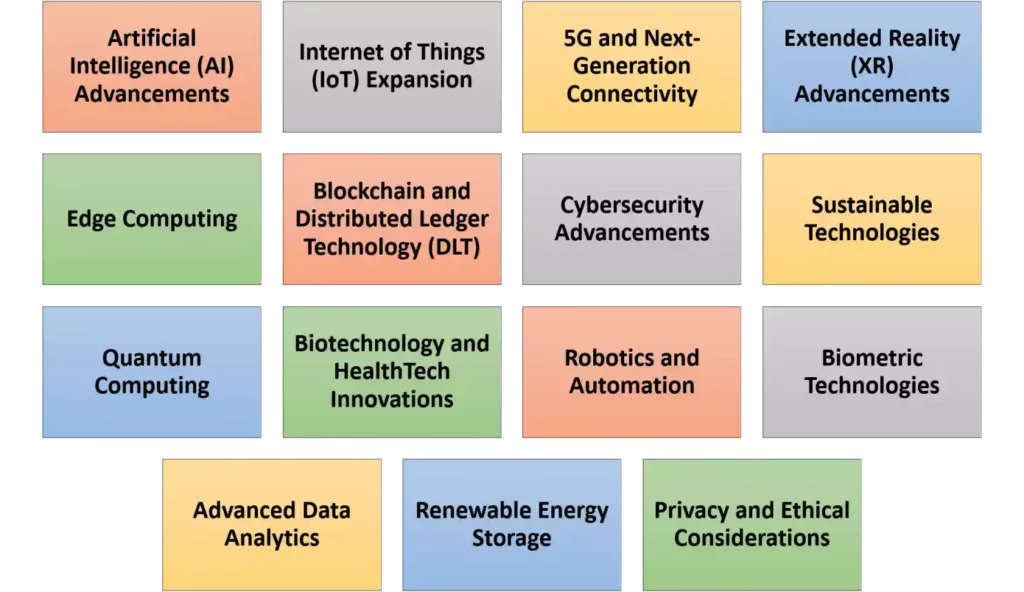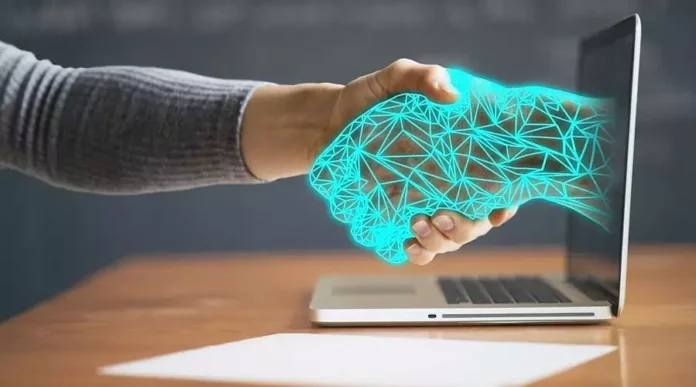The future is constantly shaped by technological advancements that revolutionize the way we live, work, and interact. In the next five years, several key technology trends are expected to emerge and drive significant transformations across various industries. These trends encompass a wide range of areas, from artificial intelligence and IoT to 5G connectivity, blockchain, and sustainability.
This overview aims to provide a comprehensive glimpse into the major future technology trends that will shape the coming years, offering examples and insights into each trend’s potential impact. The rapid advancement of technology has paved the way for exciting possibilities, and it is crucial to stay informed about the latest developments. From artificial intelligence and machine learning to blockchain and virtual reality, future technology trends are set to revolutionize various industries. These future technology trends have the potential to enhance efficiency, transform business models, and improve the overall quality of life. By exploring the advancements in these fields, we can better prepare ourselves for the challenges and opportunities that lie ahead in this era of unprecedented innovation.

Future Technology Trends:-
1. Artificial Intelligence (AI) Advancements:
- AI-powered personal assistants and chatbots will become more sophisticated, capable of understanding complex queries and providing detailed responses.
- AI-driven automation will transform industries, such as manufacturing, healthcare, and logistics, increasing efficiency and reducing costs.
- Machine learning algorithms will continue to improve, enabling better prediction and decision-making in various domains.
2. Internet of Things (IoT) Expansion:
- IoT devices will become more pervasive in homes, workplaces, and cities, facilitating the interconnection of various devices and systems.
- Smart homes will offer advanced automation and energy management, with devices like smart thermostats, lighting systems, and security cameras becoming mainstream.
- Smart cities will leverage #iot technologies to optimize transportation, waste management, energy usage, and public safety.
3. 5G and Next-Generation Connectivity:
- The widespread adoption of 5G networks will revolutionize communication, enabling faster speeds, low latency, and seamless connectivity.
- Industries like autonomous vehicles, remote surgery, and augmented reality (AR)/virtual reality (#vr ) will benefit from the enhanced capabilities of 5G.
- Internet access will become more accessible globally, bridging the digital divide and enabling the growth of emerging economies.
4. Extended Reality (XR) Advancements:
- Augmented Reality (AR) and Virtual Reality (#vr ) will continue to evolve, transforming industries such as gaming, entertainment, education, and healthcare.
- AR will find broader applications in retail, with virtual try-on experiences and interactive product displays becoming more prevalent.
- VR will offer immersive training experiences, enabling professionals to practice complex tasks in a safe and controlled environment.
5. Edge Computing:
- Edge computing will gain prominence, allowing data processing and storage to occur closer to the source, reducing latency and improving real-time decision-making.
- Edge devices will become more powerful, supporting advanced AI and IoT applications in remote locations or areas with limited connectivity.
- Industries like autonomous vehicles, smart grids, and industrial automation will leverage edge computing for faster and more efficient operations.
6. Blockchain and Distributed Ledger Technology (DLT):
- Blockchain technology will continue to disrupt various sectors, such as finance, supply chain management, and healthcare, by providing transparency, security, and decentralization.
- Governments and organizations will explore the use of blockchain for secure identity management and digital voting systems.
7. Cybersecurity Advancements:
- With the increasing frequency and complexity of cyber threats, cybersecurity measures will become more robust and sophisticated.
- Artificial intelligence and machine learning algorithms will play a significant role in identifying and mitigating emerging threats.
- Biometric authentication methods, such as facial recognition and fingerprint scanning, will gain popularity as more secure alternatives to traditional passwords.
8. Sustainable Technologies:
- The focus on sustainability will drive the development and adoption of eco-friendly technologies across industries.
- Renewable energy solutions, such as solar and wind power, will become more accessible and cost-effective.
- Electric vehicles (EVs) will gain traction, with advancements in battery technology and charging infrastructure supporting their widespread adoption.
9. Quantum Computing:
- Quantum computing will continue to advance, offering unprecedented processing power and the ability to solve complex problems more efficiently.
- Quantum computers will have implications for various fields, including cryptography, optimization, drug discovery, and climate modeling.
- While still in the early stages, quantum computing holds the potential to revolutionize industries and solve previously intractable problems.
10. Biotechnology and HealthTech Innovations:
- Biotechnology advancements will revolutionize healthcare, with personalized medicine, gene editing, and regenerative therapies becoming more prevalent.
- Wearable devices and health monitoring technologies will enable individuals to track and manage their health more effectively.
- Telemedicine and remote patient monitoring will continue to expand, improving access to healthcare services and reducing healthcare costs.
11. Robotics and Automation:
- Robotics and automation will transform industries such as manufacturing, agriculture, and logistics, enabling increased efficiency and productivity.
- Collaborative robots (co-bots) will work alongside humans in various settings, performing repetitive or dangerous tasks, and improving workplace safety.
- Autonomous delivery systems, including drones and self-driving vehicles, will become more common, revolutionizing the transportation and logistics sectors.
12. Biometric Technologies:
- Biometric authentication methods, such as facial recognition, fingerprint scanning, and iris recognition, will see broader adoption in various sectors, including banking, travel, and security.
- Biometric data will be utilized for identity verification, access control, and personalized user experiences across different devices and platforms.
- Advancements in biometric technologies will enhance security and convenience while raising privacy concerns that will need to be addressed.
13. Advanced Data Analytics:
- Data analytics will continue to evolve, leveraging big data and AI techniques to extract valuable insights and support data-driven decision-making.
- Predictive and prescriptive analytics will enable organizations to anticipate future trends, optimize operations, and enhance customer experiences.
- Real-time analytics will become increasingly crucial, empowering businesses to respond quickly to changing market dynamics and customer demands.
14. Renewable Energy Storage:
- Energy storage technologies, such as advanced batteries and hydrogen fuel cells, will become more efficient and affordable, enabling greater adoption of renewable energy sources.
- Large-scale energy storage solutions will support the stability and reliability of renewable power grids, reducing reliance on fossil fuels.
- The integration of renewable energy storage systems with smart grids will enable better energy management and grid optimization.
15. Privacy and Ethical Considerations:
- As technology continues to advance, privacy and ethical considerations will become increasingly important.
- Stricter regulations and frameworks will be developed to govern data privacy, algorithmic transparency, and the ethical use of emerging technologies.
- Organizations will be expected to prioritize user privacy, data protection, and responsible AI deployment, fostering trust among users and stakeholders.











